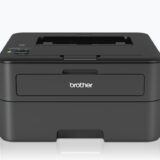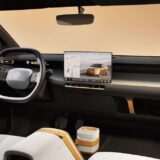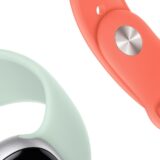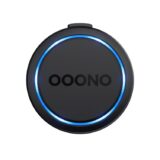BlackBerry leakt Spezifikationen des DTEK 60, 5,5 Zoll-Bruder des DTEK 50
 Solche Tipps von Lesern hat man gerne im Postfach. BlackBerry hat im Juli den BlackBerry DTEK 50 vorgestellt, ein 5,2 Zoll-Gerät, das auf Android basiert. Dieses bekommt mit dem DTEK 60 einen Bruder mit verbesserten Spezifikationen und größerem Display. BlackBerry selbst veröffentlichte die Spezifikationen, witzigerweise mit einem „do not publish“ in der Url. Falls noch erreichbar, findet Ihr die Seite an dieser Stelle. Bis auf Bilder, die noch nicht auf der Seite zu finden sind, gibt es sonst schon alle Details. Das Display kommt mit höherer Auflösung (2560 x 1440), der Prozessor ist ein Qualcomm Snapdragon 820 (Quad-Core, 2+2 Kryo, 2,15 / 1,6 GHz).
Solche Tipps von Lesern hat man gerne im Postfach. BlackBerry hat im Juli den BlackBerry DTEK 50 vorgestellt, ein 5,2 Zoll-Gerät, das auf Android basiert. Dieses bekommt mit dem DTEK 60 einen Bruder mit verbesserten Spezifikationen und größerem Display. BlackBerry selbst veröffentlichte die Spezifikationen, witzigerweise mit einem „do not publish“ in der Url. Falls noch erreichbar, findet Ihr die Seite an dieser Stelle. Bis auf Bilder, die noch nicht auf der Seite zu finden sind, gibt es sonst schon alle Details. Das Display kommt mit höherer Auflösung (2560 x 1440), der Prozessor ist ein Qualcomm Snapdragon 820 (Quad-Core, 2+2 Kryo, 2,15 / 1,6 GHz).

RAM gibt es im DTEK 60 4GB, der Speicher steigt auf 32 GB, kann aber ebenfalls per microSD-Karte erweitert werden. Auch USB-C erhält das DTEK 60, allerdings nur mit USB 2.0 Spezifikationen. Der Akku bietet 3000 mAh, unterstützt wird QuickCharge in Version 3.0. Bei der Kamera lässt es BlackBerry krachen, 21 Megapixel gibt es rückseitig, unterstützt wird auch 4K-Aufnahme mit 30 FPS.
Hier alle Informationen, wie sie bei BlackBerry zu sehen sind (oder waren):
DTEK60 & DTEK50
- Fully Android™
- Access to over a million apps on Google Play™
- 5.5″ or 5.2” scratch-resistant display
- Convenience Key
- 8MP front camera with flash
- 21MP or 13MP auto-focus rear camera
- Fingerprint Sensor (DTEK60™)
- BlackBerry Security that protects the private details of your life from being hacked
Size
DTEK60
Height 153.9 mm / 6.06 in
Width 75.4 mm / 2.97 in
Depth 7 mm / 0.28 in
DTEK50
Height 147 mm / 5.79 in
Width 72.5 mm / 2.85 in
Depth 7.4 mm / 0.29 in
Weight
DTEK60
165g / 5.82 oz
DTEK50
135g / 4.76 oz
Navigation
All-touch screen, with intuitive gesture based navigation
Keyboard
On screen BlackBerry® Keyboard
Contextual auto-correction, next-word prediction and a personalised learning engine that gets to know the way you type with on screen flick typing or seamless flow typing.
Dedicated keys
Volume Up/Down, Lock (for Power On/Off)
Customisable BlackBerry Convenience Key (usable as Mute Key when on an active call)
Resolution
DTEK60
534 PPI
2560 x 1440 Quad HD resolution
24-bit colour depth
DTEK50
424 PPI
1920 x 1080 resolution
24-bit colour depth
Screen Size
DTEK60
5.5” diagonal
16:9 aspect ratio
DTEK50
5.2” diagonal
16:9 aspect ratio
Operating system
Android OS
Processor
DTEK60
Qualcomm Snapdragon 820 64-bit Quad-Core (MSM8996 with 64 bit Quad-Core 2+2 Kryo 2.15GHz / 1.6GHz)
Adreno 530, 624MHz GPU
DTEK50
Qualcomm Snapdragon 617 Oct-Core, 64-bit (MSM8952 with 64 bit Quad-core 1.5 GHz Cortex-A53 + Quad-core 1.2 GHz Cortex-A53)
Adreno 405, 550MHz GPU
Memory
DTEK60
4 GB RAM
32 GB Flash
DTEK50
3 GB RAM
16 GB Flash
Expandable memory
Expandable memory via hot swappable microSD memory card (Up to 2TB)
Ports
DTEK60
USB Type-C
- USB 2.0 fully supported with standard USB Type C to USB Type A cable (included in box)
- USB OTG
DTEK50
Micro USB
- USB 2.0 fully supported with standard micro USB 2.0 to USB Type A cable (included in box)
Battery
DTEK60
3000 mAh 4.4V non-removable Lithium Ion battery QC3.0 Enabled – 50% charge in xx minutes
DTEK50
2610 mAh 4.4V non-removable Lithium Ion battery QC2.0 Enabled – 50% charge in 51 minutes
Battery life1
DTEK60
Up to 24 hours mixed battery life1
Up to 26 hours talk time
Up to 14 days standby time
Up to 88 hours audio playback
Up to 17 hours video playback
DTEK50
Up to 17 hours mixed battery life1
Up to 17 hours talk time
Up to 24 days standby time
Up to 40 hours audio playback
Up to 8 hours video playback
Rear Camera
DTEK60
21 megapixel auto-focus camera
4K video recording at 30 fps
720p HD video recording at 120 fps
Phase Detect Auto Focus (PDAF), Fast focus lock
HDR
6-element f2.0 lens
Dual Tone LED Flash – Enhanced photo color balance
4x digital zoom
Continuous & touch to focus, face detection, video image stabilization
Panorama, Burst, Live Filters
Multi-frame Low Light Enhancement
DTEK50
13 megapixel auto-focus camera
1080p HD video recording at 30 fps
Phase Detect Auto Focus (PDAF), Fast focus lock
HDR
6-element f2.0 lens
Dual Tone LED Flash – Enhanced photo colour balance
4x digital zoom
Continuous & touch to focus, face detection, video image stabilization
Panorama, Burst, Live Filters
Multi-frame Low Light Enhancement
Front Camera
8MP Fixed-Focus, f2.2
1.125um pixel size
84? wide angle/field of view lens
HDR, Live Filters, video image stabilization
Image & video stabilisation
1080p HD video recording at 30 fps
Selfie Flash
Wide Selfie Mode (also known as Selfie Panorama)
Multi-Frame Low Light Enhancement
Image formats
BMP, JPG, GIF, PNG, WEBP
Audio & video formats
3GP, 3G2, AAC, AVI, ADTS, ASF, AWB, DIVX, FLAC, IMY, MID, MKV, MOV, MP3, MPEG-4, MXMF, OGG, OTA, RTTTL, RTX, WAV, WEBM, WMV, XMF
Audio & video
encoding/decoding
MPEG-4, AAC+, AAC-LC, AMR-NB, AMR-WB, DivX, EVRC, FLAC, H.263, H.264, H265/HEVC, MIDI, MP3, OPUS, PCM, QCELP, VC-1, VORBIS, VP8, VP9, WMA, WMA 9/10, WMA Pro, Xvid, eAAC+
Streaming protocols
HTTP(S) Progressive Download, HTTP(S) Live Streaming (HLS) version 3, RTSP (RTP, SDP)
Pre-loaded apps
BlackBerry Applications:
BlackBerry® Keyboard, BlackBerry® Hub, BlackBerry Calendar, Contacts by BlackBerry, Notes by BlackBerry, Tasks by BlackBerry, BlackBerry Camera, BBM®, DTEK™ by BlackBerry®, BlackBerry Device Search, BlackBerry Launcher, BlackBerry Services, BlackBerry Help, BlackBerry Password Keeper, Microsoft exFAT Technology for BlackBerry, BlackBerry Content Transfer, Yahoo!® Finance
Android Applications:
Gmail™, Hangouts™, Google Chrome™, Google Drive™, Google Maps™, YouTube®, Google Play™, Google Photos, Messenger (SMS), Android Device Manager
Alerts & Notifications
Tone
Vibrate
On-screen or white (DTEK50) or red (DTEK60) LED indicator
(Some notification options are user configurable)
Network bands2
DTEK60
North America and Latin America:
LTE Advanced, with speeds up to 300 Mbps for data downloads
FD-LTE 1, 2, 3, 4, 5, 7, 12, 17, 20, 29 (2100/1900/1800/1700/850/2600/700/700/800/700/2300 MHz)
HSPA+ 1, 2, 4, 5, 8 (2100/1900/1700/850/900 MHz)
Quad band GSM/GPRS/EDGE (850/900/1800/1900 MHz)
Europe, Middle East, Africa and Asia Pacific:
FD-LTE 1, 2, 3, 4, 5, 7, 8, 19, 20, 28A (2100/1900/1800/2600/900/800/700 MHz)
TD-LTE 38, 40, 41 (2600/2300/2500 MHz)
HSPA+ 1, 2, 4, 5/6, 8 (2100/1900/850/900 MHz)
Quad band GSM/GPRS/EDGE (850/900/1800/1900 MHz)
DTEK50
North America and Latin America:
FD-LTE 1, 2, 3, 4, 5, 7, 12, 17, 20, 29, 30 (2100/1900/1800/1700/850/2600/700/700/800/700/2300 MHz)
HSPA+ 1, 2, 4, 5, 8 (2100/1900/1700/850/900 MHz)
Quad band GSM/GPRS/EDGE (850/900/1800/1900 MHz)
Europe, Middle East, Africa and Asia Pacific:
FD-LTE 1, 2, 3, 7, 8, 20, 28A (2100/1900/1800/2600/900/800/700 MHz)
TD-LTE 38, 40, 41 (2600/2300/2500 MHz)
HSPA+ 1, 2, 5/6, 8 (2100/1900/850/900 MHz)
Quad band GSM/GPRS/EDGE (850/900/1800/1900 MHz)
Wi-Fi®
802.11 b/g/n 2.4 GHz
802.11 a/n 5GHz
802.11 ac 5GHz
4G Mobile Hotspot
Wi-Fi Direct
FM Radio
Supported (DTEK50)
Bluetooth®
Bluetooth 4.2 Low Energy (LE) and EDR
GPS
Assisted, Autonomous and Simultaneous GPS
Support for User Plane and Control Plane GPS
GLONASS, BeiDou
OTDOA
Pre-loaded Google Maps
NFC
NFC technology is used to create a connection to share information between your BlackBerry device and other NFC-enabled devices or NFC tags. Features on DTEK50 that use NFC technology include Android Beam, Tap and Pay, and Tap and Go.
Sensors
Accelerometer
Magnetometer
Gyroscope
Proximity
Ambient light
Hall Effect
Fingerprint sensor (DTEK60)
Accessibility
Google TalkBack screen reader for audible output
Face-to-face video chat with Google Hangouts
Google Now voice assistance to answer questions and perform actions
Scalable fonts and magnification to zoom in or zoom out
Closed Captioning support
High contrast text, colour inversion and colour correction
Certain models rated for use with hearing aids









Ein kleiner Fehler hat sich eingeschlichen „BalckBerry“
„BalckBerry“
Thx!
auch das DTEK50 hat USG OTG, laut BB Seite. Ein kleines aber für mich (Robotik) sehr feines Feature.
Akku nicht wechselbar. Daher Wegwerfartikel.
@kritiker
es gibt wohl derzeit kein smartphone bei dem der akku nicht wechselbar ist. wenn der akku nach ca 3 jahren etwas schlapp macht, kannst du ihn aber halt fast nie selber tauschen, sondern solltest jemanden ranlassen, der das kann. kostet dich dann mind. 30 euro arbeitslohn. machbar, oder?
Es ist immer wieder lustig, wie versucht wird, keinen userseitigen Akkuwechsel vorsehendes Devicedesign kritisierende User ins Lächerliche zu ziehen. Faktum ist, dass kein sachlicher Grund neben geringer Kostenersparnis bei der Herstellung und der Möglichkeit minimal dünnerer Devices für dieses Devicedesign existiert und dass der User durch dieses Devicedesign vom Support des Herstellers und teils unseriöser externer Dienstleister abhängig gemacht und die durchschnittliche Nutzungsdauer der Devices verkürzt wird. Nebenbei bemerkt, die Qualität des Support durch BlackBerry nach dem Kauf ist nach verbreiteten Erfahrungen ebenso wie die des Supports durch Samsung nach dem Kauf sehr bescheiden.